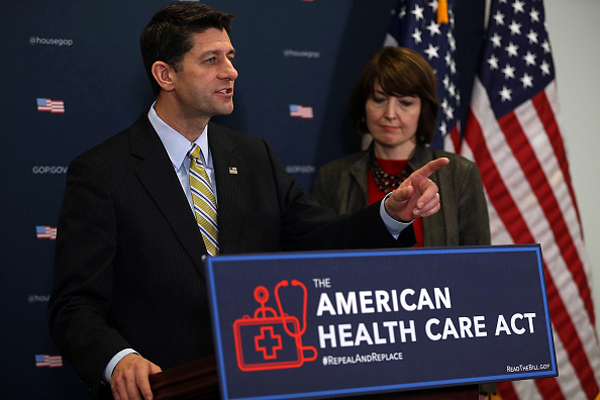- La Feria Community Holds Succesful Business Mixer Event
- Little Nashville to Take Place in Downtown Mercedes
- Lions Basketball Captures District Gold
- La Feria ISD Students Compete in Regional Chess Tournament
- Lions End First Half of 32-4A on a High Note
- La Feria ISD Held Another Successful Parent Conference
- Strong Appearance for Lions at Hidalgo Power Meet
- LFECHS Students Get to Meet Local Actress
- Students Participate in Marine Biology Camp
- Two LFECHS Students Qualify for All-State Band
CBO Report: 23 Million to Lose Coverage Under AHCA
- Updated: June 9, 2017

House Speaker Paul Ryan, left, discusses the American Health Care Act at a recent news conference. Photo: Sullivan/GettyImages
by Mark Richardson
AUSTIN, Texas – The Congressional Budget Office says 23 million Americans would lose their health insurance by 2026 if the American Health Care Act becomes law. Some 14 million of those 23 million would lose coverage because of plans to cut Medicaid by $884 billion.
Andy Slavitt, a senior adviser with the Bipartisan Policy Center, says states including Texas would have a hard time making up for a loss of federal Medicaid dollars.
“Kids, seniors, people with disabilities, low-income people lose their benefits,” he says. “I think we’d see hospitals have their ERs flooded again with patients who are not paying. It would obviously have a negative impact on the economy.”
The CBO predicts the uninsured rate would increase from 10 percent to close to 18 percent in the next decade. Texas already has the highest rate of uninsured people in the country.
The AHCA narrowly passed in the U.S. House earlier this month. Some Senate Republicans have promised that Medicaid recipients would be protected under the new law.
The CBO says the Republican plan could lower premiums by four to 20 percent by 2026. Slavitt notes those reductions would come at the expense of rising costs for low-income people as well as those with pre-existing conditions.
The plan also has a so-called “age tax,” which means Texans and others aged 50 to 64 would pay much higher premiums.
“Under the new law, if it were to pass, people who were in that age group would be able to be charged five times as much for insurance as younger people – in some cases, as much as $7,000 of additional costs to get covered,” he adds.
Proponents of the plan argue that block-granting Medicaid funds to states would spark innovative solutions. Slavitt disagrees.
“This really is about the federal government saving money – cutting the money that they give to states for care, and then taking that money and turning around and providing a tax break to very high-income people, the insurance companies, pharmaceutical companies,” he explains.
The CBO estimates the Republican bill could cut the federal deficit by $119 billion in 10 years.
The Congressional Budget Office says 23-million Americans would lose their health insurance by 2026 if the American Health Care Act becomes law. Mark Richardson looks at who is most at risk.


